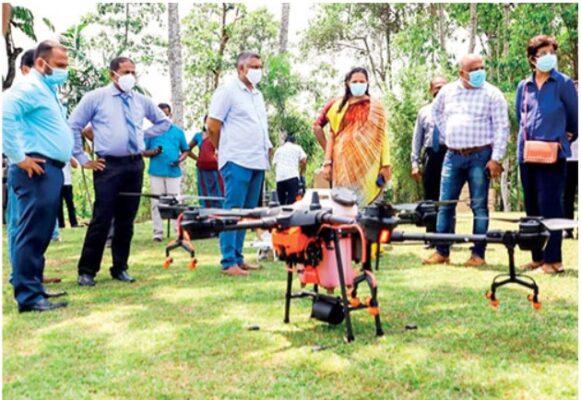Drones used for first time in SL to fight rubber leaf fungus

Source:Island
For the first time in Sri Lanka, drone technology is being used to control the leaf fungus disease in rubber plantations, Company Estate Reforms, Tea Estate Related Crops, Tea Factory Modernization and Tea Export Promotion State Minister Kanaka Herath says.
Under the project, Minister Herath said it had been planned to spray fungal controlling chemicals using drones, which is designed especially for agricultural purposes.
The State Minister while observing a chemical spraying pilot project using drones recently said that the fungal disease that infects rubber plantations should be brought under control promptly otherwise it would be a huge threat to the entire rubber industry. He assumed that with using drone technology as well as modern pest control methods they would be able to control the fungal disease quickly and prevent it from spreading to other areas.
The pilot project of spraying chemicals with drones was carried out at the Panawatta Estate in Yatiyantota recently under the supervision of Rubber Research Institute (RRI) officials.
To control the fungal disease named Pestalotiopsis, chemicals are sprayed on the leaves of the rubber trees. Affected rubber leaves can be seen with yellow spots and gradually the green part of the leaf will fade away.
“Applying chemicals onto the leaves using drones is rather effective than applying chemicals from the ground as there are several practical issues. It is practically difficult to carry heavy chemical spaying machines throughout the plantation as most of the rubber plantations are on hilly areas” State Minister Herath said.
The fungal disease, which was harmful to rubber cultivation, was first reported in the Kalawana area in Ratnapura in 2019 and today it had spread to other districts such as Kegalle and Kalutara. Rubber Research Institute Deputy Director Dr. Priyani Seneviratne said.
There was a high probability of the disease spreading especially in areas with a high rainfall, she said.
“The disease was reported in 2017 in Indonesia and 2018 in Malaysia. On average, it is estimated that there will be a 30 per cent reduction in yields. “she pointed out.
Not only rubber plantations but also many plants including avocado and a few others were affected by the fungal disease. If more than 50 per cent of leaves fall off, rubber taping for rubber latex cannot be carried out. In such occasions it is reported a yield drop around 30 per cent.
The RRI Deputy Director said that the RRI would study the productivity of the pilot project and make extensive use of drone technology to prevent the disease.
Dr Seneviratne also noted that although many of the fungal diseases were usually prevalent in one rubber species and are resistant to other strains, it was observed that the particular fungal disease had spread to all species.







